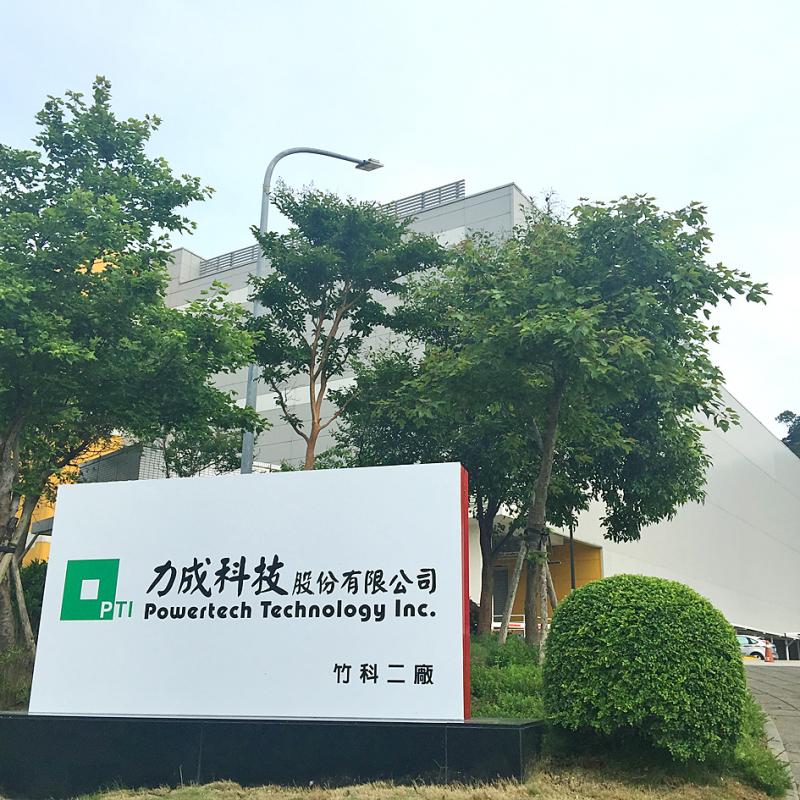Memorychip packaging and testing service provider Powertech Technology Inc (力成科技) plans to invest more than NT$20 billion (US$719.17 million) to build a second production facility at the Hsinchu Science Park (新竹科學園區) as part of the government’s Invest in Taiwan initiative, the Ministry of Economic Affairs said yesterday.
Powertech was prompted to “reshore,” or shift its manufacturing facilities from China back to Taiwan, by a US-China trade dispute, InvesTaiwan Service Center interim spokeswoman Nicole Chen (陳明珠) said.
“We have been working with them since 2019 to come up with a plan that will allow them to be included in the initiative,” Chen said.

Photo: Grace Hung, Taipei Times
The initiative rewards projects with favorable financing terms, with the government footing the bill for some bank fees, she said.
The government also helps companies find sites and labor, although this was not required by Powertech, she said.
In return, the firm has to show that the investment will be in high-value “smart” manufacturing and create jobs that pay well, she said.
More than 2,000 jobs will be created by this investment, the ministry said in a release.
“It is not easy to hire workers in Taiwan,” Chen said. “We only want to create quality jobs that create a lot of value.”
In addition to its second manufacturing location in Hsinchu, Powertech is to upgrade its four existing production facilities in Taiwan with the funds.
Seven other companies were approved by the Invest in Taiwan committee, but unlike Powertech, they were small or medium-sized firms — having a market cap of less than NT$2 billion and generally fewer than 200 employees.
They have to meet the same criteria for smart manufacturing, Chen said.
“It does not matter whether you are making semiconductors or noodles,” she said.
A-Sha Foods Enterprise (阿舍食品企業), a maker of premium packaged ramen noodles, is to invest NT$700 million in a new Tainan facility using AI to monitor production, Chen said, adding that 115 jobs would be created.
Companies in the initiative have to outline requirements for resources such as water and electricity, Chen said in response to questions over whether the reshoring program would add to the stress on utilities in Taiwan amid power outages and a water shortage.
“In this way, we can keep track of how much additional water and electricity they require, and make sure Taiwan can plan for its resource needs,” she said.

South Korea’s equity benchmark yesterday crossed a new milestone just a month after surpassing the once-unthinkable 5,000 mark as surging global memory demand powers the country’s biggest chipmakers. The KOSPI advanced as much as 2.6 percent to a record 6,123, with Samsung Electronics Co and SK Hynix Inc each gaining more than 2 percent. With the benchmark now up 45 percent this year, South Korea’s stock market capitalization has also moved past France’s, following last month’s overtaking of Germany’s. Long overlooked by foreign funds, despite being undervalued, South Korean stocks have now emerged as clear winners in the global market. The so-called “artificial intelligence

‘SEISMIC SHIFT’: The researcher forecast there would be about 1.1 billion mobile shipments this year, down from 1.26 billion the prior year and erasing years of gains The global smartphone market is expected to contract 12.9 percent this year due to the unprecedented memorychip shortage, marking “a crisis like no other,” researcher International Data Corp (IDC) said. The new forecast, a dramatic revision down from earlier estimates, gives the latest accounting of the ongoing memory crunch that is affecting every corner of the electronics industry. The demand for advanced memory to power artificial intelligence (AI) tasks has drained global supply until well into next year and jeopardizes the business model of many smartphone makers. IDC forecast about 1.1 billion mobile shipments this year, down from 1.26 billion the prior

People stand in a Pokemon store in Tokyo on Thursday. One of the world highest-grossing franchises is celebrated its 30th anniversary yesterday.

Chinese artificial intelligence (AI) start-up DeepSeek’s (深度求索) latest AI model, set to be released as soon as next week, was trained on Nvidia Corp’s most advanced AI chip, the Blackwell, a senior official of US President Donald Trump’s administration said on Monday, in what could represent a violation of US export controls. The US believes DeepSeek will remove the technical indicators that might reveal its use of American AI chips, the official said, adding that the Blackwells are likely clustered at its data center in Inner Mongolia, an autonomous region of China. The person declined to say how the US government received